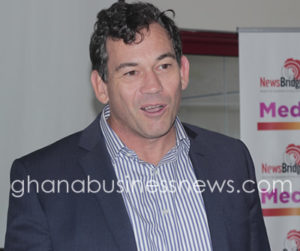Anas’ kind of journalism is fearless – Diplomat

The Deputy Australian High Commissioner to Ghana has reiterated the importance of journalism to democracy and said he appreciates the kind of journalism that Anas Aremeyaw Anas does, describing it as fearless.
“His journalism is fearless journalism,” he said. He also pointed out that the Ghanaian media is partisan, stating that some journalists who were vociferous in the past have become quiet after the last election.
Glen Askew, said these when he delivered closing remarks at a training for journalists in Accra Friday July 13, 2018.
The two-day training organized by NewsBridge Africa with support from the Australian High Commission in Ghana brought together 20 journalists from different media organizations in Accra spanning radio, TV, print and online.
Askew said supporting NewsBridge Africa to organize the training was the first time the Australian people through the High Commission was investing in media training. He added that, the media is important to democratic advancement hence their decision to support NewsBridge Africa to build capacity of journalists to enable them play their watchdog role effectively in holding to account, those at the wheel of affairs.
“Australia is supporting this training because journalists are important to democracy. They hold public officials to account,”Askew said.
Togolese investigative journalist, Maxime Domegni who is also a member of the International Consortium of Investigative Journalists (ICIJ), extolled the work that Anas does and urged journalists to conduct their work with utmost integrity and credibility to help Africa win the fight against corruption.
”No amount of money is enough to buy your integrity as a journalist,” Domegni added.
The workshop was on the theme: “Getting the facts right in the era of social media” with the hashtag #JournalismIsFacts.
Emmanuel Dogbevi, the Managing Editor of ghanabusinessnews.com and Executive Director of NewsBridge Africa who was lead facilitator for the training emphasised the need for verifying information before it gets into the news. He advised the journalists to always do the three basic things required for every journalist to do before publishing the news: “cross-check, cross-check and cross-check,” he said.
He also urged the journalists to work hard to earn the public’s respect by conducting themselves ethically and upholding the highest ethical standards of journalism.
“It is an obligation in journalism to make efforts to verify every information you publish as news,” he said, “that’s how you win the public’s confidence and respect.”
Some participants shared their views:
“This training is the sort of professional development exercise that every person in the media space must have.
The take home for the first day of the training for me, was the need for verification of facts by journalists. In today’s era where everything is controlled and skewed according to politicians, it is important that we find out what the true facts are in the conversations we have in the public space,” says Patrick Kwabena Stephenson, Head of Research at IMANI Center of Policy and Education, and News Anchor at GHOne TV.
“I am now informed to go extra deeper to verify what I have for our audience. Probably we were doing it but today, it has kind of heightened my ideas on how I can go a step further in discharging and knowing what suits the standards of journalism, “ – Kwaku Kyei, Head of Social Media, JoyNews.
Participants were taken through hands-on fact-checking steps and how those facts can be organized and presented in telling the story in their reportage. They were also introduced to how social media is rapidly changing the face of journalism and how they, as journalists can effectively and efficiently combine digital journalism and traditional journalism in the discharge of their duties as professionals.
By Bismark Elorm Addo
Copyright ©2018 by Creative Imaginations Publicity
All rights reserved. This news item or any portion thereof may not be reproduced or used in any manner whatsoever without the express written permission of the publisher except for the use of brief quotations in reviews.
